-
 Bitcoin
Bitcoin $76,444.7530
-3.77% -
 Ethereum
Ethereum $1,473.8355
-5.46% -
 Tether USDt
Tether USDt $0.9991
-0.08% -
 XRP
XRP $1.7965
-5.51% -
 BNB
BNB $553.4919
-0.36% -
 USDC
USDC $0.9999
-0.02% -
 Solana
Solana $105.2981
-1.74% -
 TRON
TRON $0.2303
0.81% -
 Dogecoin
Dogecoin $0.1422
-4.62% -
 Cardano
Cardano $0.5587
-4.41% -
 UNUS SED LEO
UNUS SED LEO $8.9866
1.01% -
 Toncoin
Toncoin $2.9933
-4.74% -
 Chainlink
Chainlink $10.9113
-4.81% -
 Stellar
Stellar $0.2215
-4.76% -
 Avalanche
Avalanche $16.1163
-3.29% -
 Sui
Sui $1.9371
-3.89% -
 Shiba Inu
Shiba Inu $0.0...01065
-6.69% -
 Hedera
Hedera $0.1469
-3.29% -
 MANTRA
MANTRA $6.2058
-1.53% -
 Dai
Dai $1.0000
0.01% -
 Bitcoin Cash
Bitcoin Cash $269.3457
-2.08% -
 Polkadot
Polkadot $3.3773
-5.87% -
 Litecoin
Litecoin $69.2204
-2.50% -
 Ethena USDe
Ethena USDe $0.9986
-0.01% -
 Bitget Token
Bitget Token $4.0180
-3.25% -
 Pi
Pi $0.5649
-4.50% -
 Hyperliquid
Hyperliquid $11.1928
-2.80% -
 Monero
Monero $195.3885
-4.41% -
 OKB
OKB $50.9235
-0.59% -
 Uniswap
Uniswap $4.7688
-6.95%
Getting Started with GPU Mining and Detailed Equipment Setup
GPU mining uses GPUs' parallel processing to solve crypto puzzles, earning rewards. Profitability depends on coin choice, network difficulty, and energy costs.
Apr 07, 2025 at 04:35 am
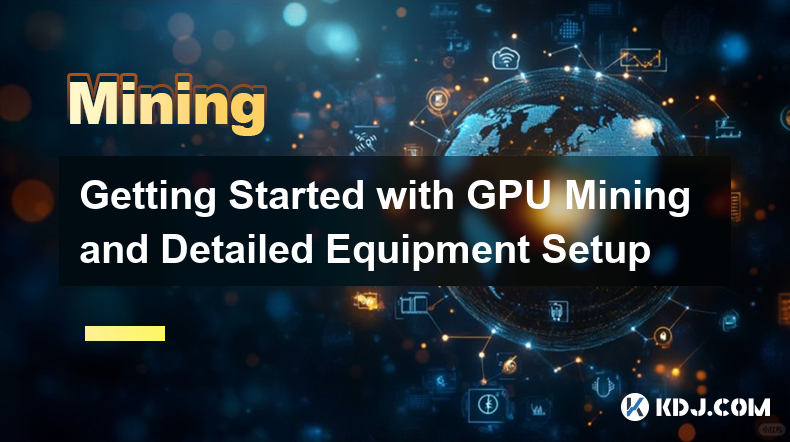
Understanding GPU Mining
GPU mining, or graphics processing unit mining, leverages the parallel processing power of GPUs to solve complex cryptographic problems, validating transactions and earning cryptocurrency rewards. Unlike CPU mining, which relies on a computer's central processing unit, GPU mining offers significantly higher hashing power, making it more efficient for certain cryptocurrencies. This efficiency translates to a higher probability of earning rewards, though profitability is always dependent on several factors, including the cryptocurrency's value and network difficulty. Choosing the right cryptocurrency to mine is crucial for maximizing returns.
Selecting Your Cryptocurrency
The profitability of GPU mining varies greatly depending on the cryptocurrency you choose. Some cryptocurrencies, like Ethereum (although now proof-of-stake), were historically very profitable to mine with GPUs. Others are less so, or may require specialized hardware. Factors to consider include the cryptocurrency's current price, the network's difficulty (how hard it is to solve the cryptographic problems), and the energy consumption of your mining operation. Research thoroughly before committing to a specific coin. Consider using online mining profitability calculators to help you make an informed decision.
Choosing Your GPU
The heart of your mining operation is the GPU. Selecting the right GPU is paramount for efficiency and profitability. Modern GPUs with high memory bandwidth and CUDA cores are generally preferred. AMD and Nvidia both produce suitable GPUs, and the best choice will depend on the specific cryptocurrency you are mining and your budget. Higher-end cards offer better performance but come with a higher price tag and increased power consumption. Consider factors like hash rate (measured in hashes per second), power consumption (measured in watts), and memory capacity (measured in gigabytes).
Assembling Your Mining Rig
Building a mining rig involves more than just a GPU. You'll need several essential components to create a functional and efficient system.
- Motherboard: Choose a motherboard with enough PCI-e slots to accommodate your GPUs. Consider motherboards specifically designed for mining, as they often have more PCI-e slots and other features optimized for this purpose.
- CPU: The CPU's role is less critical than the GPU in mining, so a relatively inexpensive but stable CPU will suffice.
- RAM: Sufficient RAM is needed for the operating system and mining software. 8GB to 16GB is usually adequate.
- Power Supply (PSU): This is crucial. The PSU must have enough wattage to power all your GPUs and other components, with a significant margin for safety. Underpowering your rig can lead to instability and damage.
- Case: A large case is necessary to accommodate multiple GPUs and ensure adequate airflow for cooling.
- Operating System: Linux distributions are generally preferred for GPU mining due to their stability and efficiency.
- Cooling System: Efficient cooling is crucial to prevent overheating and maintain optimal performance. Consider using additional fans, liquid cooling, or a combination of both.
Setting Up Your Mining Software
Once your hardware is assembled, you need mining software to control your GPUs and connect to a mining pool.
- Choose a Mining Pool: Mining pools combine the hashing power of multiple miners, increasing your chances of earning rewards. Research different pools and choose one with a good reputation, low fees, and a stable connection.
- Install Mining Software: Popular mining software options include NiceHash Miner, TeamRedMiner, and others. The specific software you choose will depend on the cryptocurrency you are mining and your hardware. Follow the software's instructions carefully for installation and configuration.
- Configure Your Mining Software: You'll need to configure your software to connect to your chosen mining pool and specify your wallet address where your earned cryptocurrency will be sent. Double-check all settings before starting to mine to avoid errors.
Monitoring Your Mining Rig
After setting up your mining rig, continuous monitoring is essential. Regularly check your GPUs' temperatures, hash rates, and power consumption. High temperatures can damage your hardware, while low hash rates indicate potential problems. Use monitoring software to track these metrics and alert you to any issues.
Power Consumption and Costs
GPU mining is energy-intensive. Calculate your electricity costs carefully to ensure your mining operation remains profitable. Consider the cost per kilowatt-hour (kWh) in your area and the power consumption of your mining rig. Factor this into your profitability calculations.
Overclocking Your GPUs (Advanced)
Overclocking your GPUs can increase their hash rates, potentially boosting your earnings. However, it also increases the risk of overheating and hardware damage. Proceed with caution and only overclock if you understand the risks. Start with small overclocks and monitor your GPUs' temperatures closely.
Frequently Asked Questions
Q: What is the best GPU for mining?
A: There's no single "best" GPU. The optimal choice depends on the cryptocurrency you're mining, your budget, and the current market. Higher-end cards generally offer better performance but are more expensive. Research current benchmarks and reviews to make an informed decision.
Q: How much can I earn from GPU mining?
A: Earnings vary significantly based on factors like the cryptocurrency's price, the network's difficulty, your hardware's hash rate, electricity costs, and the mining pool's fees. Profitability calculators can provide estimates, but actual earnings may differ.
Q: Is GPU mining profitable?
A: Profitability is highly dependent on the factors mentioned above. What was profitable yesterday might not be profitable today. Thorough research and careful calculation of costs are essential before investing in GPU mining.
Q: What are the risks associated with GPU mining?
A: Risks include hardware failure due to overheating or other issues, fluctuating cryptocurrency prices leading to losses, and the potential for scams or malicious software. Proper research and risk mitigation strategies are crucial.
Q: How much does it cost to set up a GPU mining rig?
A: Costs vary greatly depending on the number and type of GPUs, other hardware components, and electricity costs. Expect a significant upfront investment.
Q: Is GPU mining legal?
A: The legality of GPU mining depends on your location and the specific cryptocurrency you are mining. Always ensure compliance with local laws and regulations.
Disclaimer:info@kdj.com
The information provided is not trading advice. kdj.com does not assume any responsibility for any investments made based on the information provided in this article. Cryptocurrencies are highly volatile and it is highly recommended that you invest with caution after thorough research!
If you believe that the content used on this website infringes your copyright, please contact us immediately (info@kdj.com) and we will delete it promptly.
- "Cardano (ADA) Price Could Dip Below $0.60, Following Previous Market Cycle"
- 2025-04-09 05:10:12
- BONK, the well-known meme coin, has risen over 35% in the last week, attracting meme coin investors in the market. So, what caused this rally?
- 2025-04-09 05:10:12
- Bitcoin (BTC) Investors May Not Exactly Feel It, but BTC Has Been a Relatively Good Bet
- 2025-04-09 05:05:12
- Donald's Bitcoin (DONBTC) Could Turn Early Investors into Multi-Millionaires, Like Shiba Inu (SHIB) and Dogecoin (DOGE) Did
- 2025-04-09 05:05:12
- 6 Upcoming Kraken Listings That Could Be the Next Big Thing in Crypto
- 2025-04-09 05:00:13
- COTI Unveils New Privacy-Focused Blockchain to Reshape Web3 Transactions
- 2025-04-09 05:00:13
Related knowledge
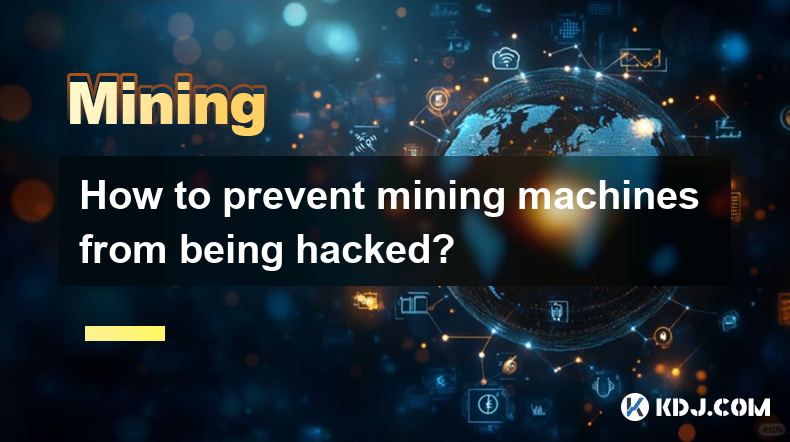
How to prevent mining machines from being hacked?
Apr 08,2025 at 09:00pm
In the world of cryptocurrency, mining machines play a crucial role in securing networks and validating transactions. However, these machines are also prime targets for hackers looking to exploit vulnerabilities for financial gain. Preventing mining machines from being hacked requires a multi-faceted approach that includes robust security measures, regu...
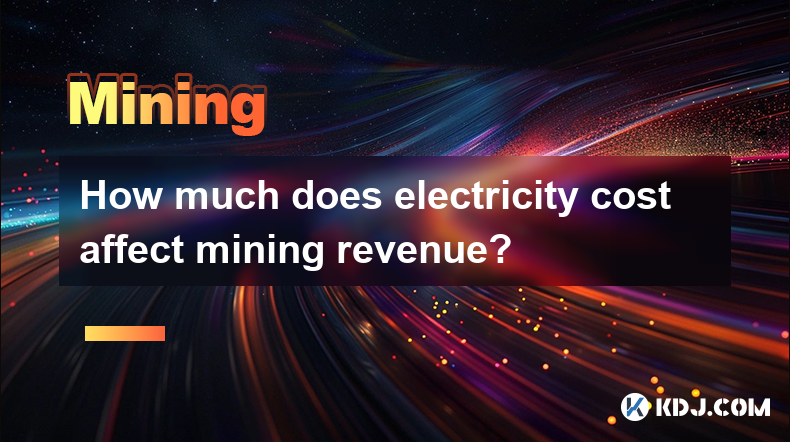
How much does electricity cost affect mining revenue?
Apr 08,2025 at 05:29pm
The cost of electricity plays a crucial role in determining the profitability of cryptocurrency mining. Mining revenue is directly impacted by the expenses incurred in running mining equipment, with electricity costs often being the most significant operational expense. Understanding how electricity costs affect mining revenue is essential for miners lo...
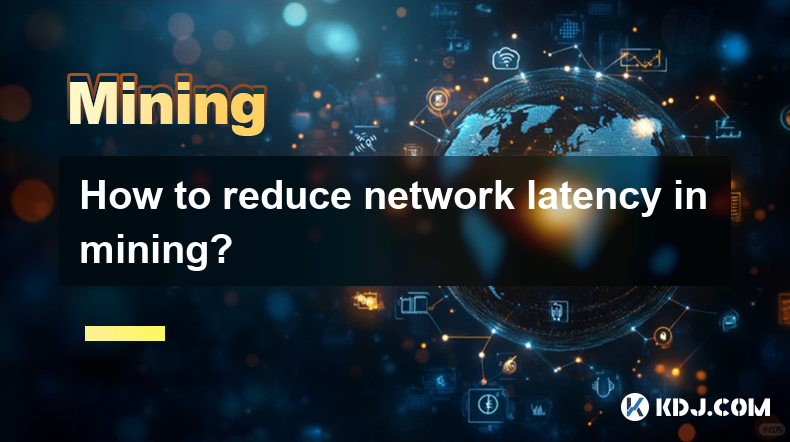
How to reduce network latency in mining?
Apr 09,2025 at 02:28am
Understanding Network Latency in MiningNetwork latency is a critical factor in the world of cryptocurrency mining. It refers to the time it takes for data to travel from its source to its destination across a network. In mining, lower latency can mean the difference between successfully adding a block to the blockchain and missing out on the reward. Red...

What is hashrate fluctuation?
Apr 08,2025 at 08:08pm
Hashrate fluctuation refers to the changes in the total computational power used by miners to process transactions and secure the blockchain network. This metric is crucial in the cryptocurrency world, particularly for networks like Bitcoin, Ethereum, and others that rely on proof-of-work (PoW) consensus mechanisms. Understanding hashrate fluctuation is...
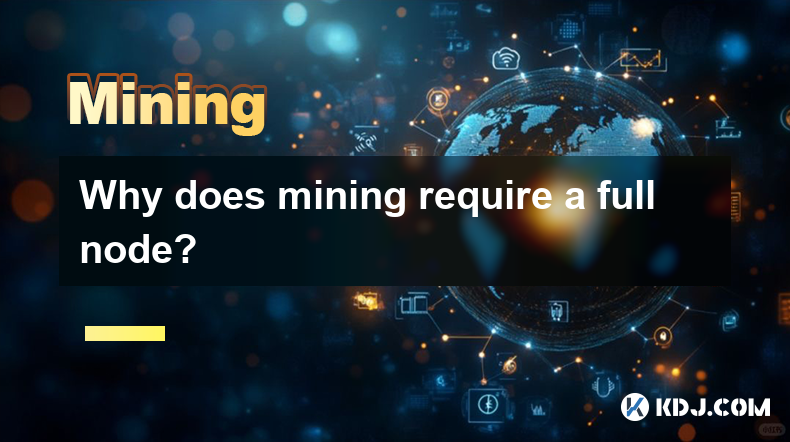
Why does mining require a full node?
Apr 08,2025 at 06:49pm
Mining in the cryptocurrency world is a complex process that involves verifying transactions and adding them to the blockchain. One of the key components required for mining is a full node. But why is a full node necessary for mining? Let's delve into the reasons and explore the intricacies of this requirement. What is a Full Node?A full node is a progr...
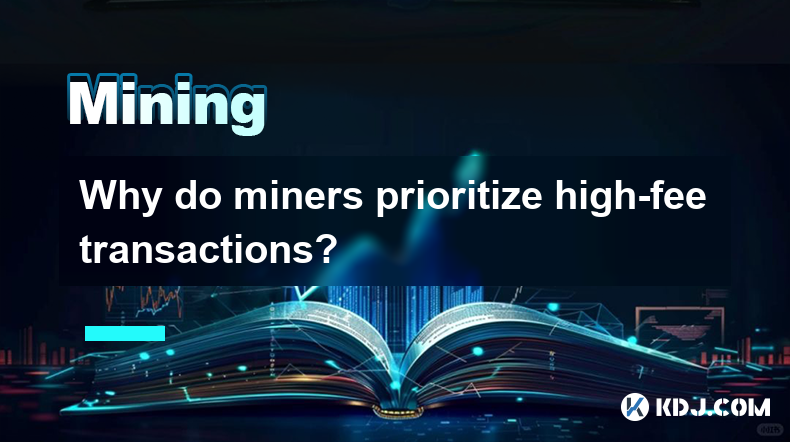
Why do miners prioritize high-fee transactions?
Apr 08,2025 at 05:01pm
Miners in the cryptocurrency ecosystem, particularly in networks like Bitcoin, play a crucial role in validating and adding transactions to the blockchain. One of the key factors that influence their decision-making process is the transaction fee associated with each transaction. Miners prioritize high-fee transactions primarily because these fees direc...

How to prevent mining machines from being hacked?
Apr 08,2025 at 09:00pm
In the world of cryptocurrency, mining machines play a crucial role in securing networks and validating transactions. However, these machines are also prime targets for hackers looking to exploit vulnerabilities for financial gain. Preventing mining machines from being hacked requires a multi-faceted approach that includes robust security measures, regu...

How much does electricity cost affect mining revenue?
Apr 08,2025 at 05:29pm
The cost of electricity plays a crucial role in determining the profitability of cryptocurrency mining. Mining revenue is directly impacted by the expenses incurred in running mining equipment, with electricity costs often being the most significant operational expense. Understanding how electricity costs affect mining revenue is essential for miners lo...

How to reduce network latency in mining?
Apr 09,2025 at 02:28am
Understanding Network Latency in MiningNetwork latency is a critical factor in the world of cryptocurrency mining. It refers to the time it takes for data to travel from its source to its destination across a network. In mining, lower latency can mean the difference between successfully adding a block to the blockchain and missing out on the reward. Red...

What is hashrate fluctuation?
Apr 08,2025 at 08:08pm
Hashrate fluctuation refers to the changes in the total computational power used by miners to process transactions and secure the blockchain network. This metric is crucial in the cryptocurrency world, particularly for networks like Bitcoin, Ethereum, and others that rely on proof-of-work (PoW) consensus mechanisms. Understanding hashrate fluctuation is...

Why does mining require a full node?
Apr 08,2025 at 06:49pm
Mining in the cryptocurrency world is a complex process that involves verifying transactions and adding them to the blockchain. One of the key components required for mining is a full node. But why is a full node necessary for mining? Let's delve into the reasons and explore the intricacies of this requirement. What is a Full Node?A full node is a progr...

Why do miners prioritize high-fee transactions?
Apr 08,2025 at 05:01pm
Miners in the cryptocurrency ecosystem, particularly in networks like Bitcoin, play a crucial role in validating and adding transactions to the blockchain. One of the key factors that influence their decision-making process is the transaction fee associated with each transaction. Miners prioritize high-fee transactions primarily because these fees direc...
See all articles






















































































